A Professional Relapse
I began my career as a psychotherapist when I was 24 years old. I was not yet a year out of graduate school. I was eager, ambitious, and ready to start this next chapter in my life. And like many social work graduates, I had grand plans to save the world.
I knew I wanted to focus on eating disorders treatment, which was born out of my own struggle with bulimia, but at that time, it felt too soon out of my own recovery, and honestly, I felt too wet behind the ears as a clinician, so eating disorder treatment needed to take a back seat.
A year or so had passed, I gained some experience, and due to the growing need for eating disorders treatment in our area, my supervisor approached me and asked if I was finally ready to open myself up to this work. I guess that’s where this story begins.
Over the course of 13-plus years most of my clinical work has focused on eating disorders treatment. I have taken part in community panel discussions, been a regular guest on a radio show, spoke to schools, provided in-services, attended trainings, collaborated with other professionals and facilities, and saw dozens and dozens of patients and their families for treatment.
My name had become pretty well known as a treatment provider and referral source to the eating disorder community. I had done what I set out to do; I was educating the community, getting my name out there and helping anyone I could who needed it. I enjoyed my work and all I had done to become established, but I’ll admit, a part of me had become a little jaded.
The passion I had so many years back had started to diminish a little. I know this work is challenging and burnout is high, but something had changed in me. Maybe it was because of life stressors, or getting older. I’m not entirely sure.
It’s strange how often all of the signs are there, but even those of us most learned are blind to the storm that’s about to hit. Well, the signs were all there, and the storm did hit, and boy did it knock me sideways. In 2015, after a series of emotional struggles and physical issues, I relapsed and found myself at the mercy of ED again after 17 years in recovery, now suffering with anorexia.
As I said, it wasn’t one thing, it was a series of things culminating into one perfect storm and before I could accept or even realize what was happening, I was already in the throes of the disease. The darkness had overcome me, and it was the lowest I’d felt in a long time. I felt so much shame and guilt, not because of the eating disorder so much, but because as a professional, I do know these things happen.
But as a professional, how did I let this happen? That’s a strange question in itself, somehow, presuming being a professional makes you immune to these kinds of things. I wondered what my colleagues thought of me. Would I lose the respect of the many professionals I had collaborated with over all of these years, if they knew my secret? I worried that my patients would no longer trust in the one person they had invested their recovery in and lose faith in their own fight. So there I was, the therapist suddenly turned patient. This was a very different scenario than the start of my career.
Now what? Where does the eating disorder therapist get eating disorder treatment? Do I go to the facilities I refer all of the people I see to and sit in group next to the patient I only referred a month ago? Will I be receiving therapy from someone I share cases with? Will providers ever refer to me again? Will my colleagues respect me? Will my patients think I’m a fraud? Then the other set of concerns…Can my family afford this? Does my short term disability cover mental health? No, it does not! What on earth was I going to do?! It felt like a hole with no end in sight.
In the end, knowing colleagues and having a great support network helped me out of my darkest hours. I figured out a way to make it work the best I could. Was it absolutely ideal, I don’t know, but I made it work and it was effective. I worked hard to get well, with the help of my providers, family, and friends. I knew that restricting those who loved me would only keep me sick, so I opened myself up and allowed for those around me to nourish and support my recovery. I had years of experience doing this work, which helped in my own treatment, but in a way that was different.
My therapist and nutritionist helped me use my experience in a deeper more connected way with my patients. There were so many times, I sat in those appointments, dreading going, as I know many of my patients do at times. I had forgotten how uncomfortable treatment was, and in those days/months, I was right where so many of my patients had been. I guess you can say that it was a humbling experience. It gave me a renewed sense of empathy. I was able to understand their struggles, in a different more meaningful way.
I also developed a renewed sense of passion for this work. A fire started to burn inside of me, which pushes me to keep fighting not just for myself, but for anyone suffering with an eating disorder. I’ve always valued my patients, and how they allow me to be part of their journey. But now I have an even greater respect for this process.
When I meet a young girl at the age of 15 who can’t see beyond her anorexia and socializing is too much to fathom, I truly understand how scary this is for her. She sits with me week after week, struggling, fighting and unable to find her voice and now two years later is healthy, in mind and body, out every weekend with friends, and excited to be going off to college. This is something to celebrate.
I know the work I do isn’t all about victories. It’s about the climb. The climb is the most challenging part. It requires patience, persistence, and could be unpredictable at times, but man, when you get to the top, it’s a pretty amazing. I know this all too well and I don’t regret my relapse for one second, because it made me appreciate not only the victories but the climb to recovery.
Dianna Chillo-Havercamp has been practicing psychotherapy for close to 18 years. She specializes in the treatment of eating disorders in private practice and provides individual, group, and family treatment. She has provided lectures and educational seminars on eating disorders to schools and colleges, and has also been a regular guest on a local talk radio show, Health Matters. After close to 20 years in recovery, and as a mother to a young daughter, her views on treatment with her clients, educating others, and promoting awareness are clearer to her and her passion is stronger than ever.





